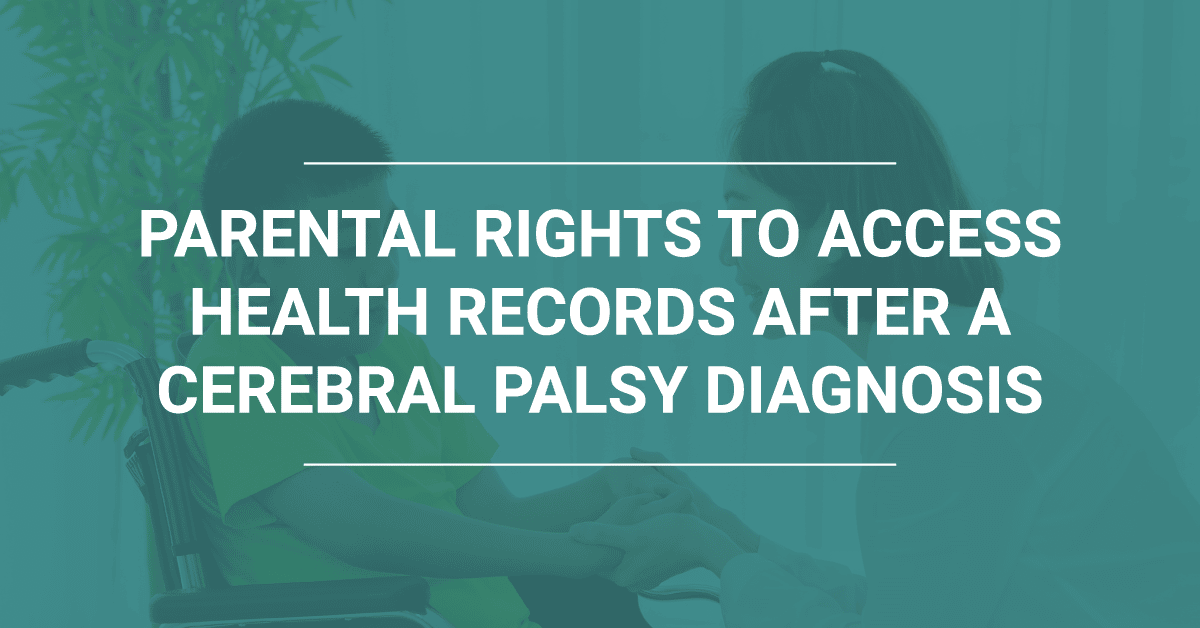
If your child has been diagnosed with cerebral palsy, you may be overwhelmed by the news and unsure of what to do next. Cerebral palsy is a birth injury that is often caused by preventable medical errors. Obtaining your child’s medical records may be the key to determining what exactly happened.
To get access to a minor child’s health records, you will need to submit a request to the hospital or healthcare provider. They may object or try to delay disclosing the records because of their fear of legal consequences. Under privacy laws in every province in Canada, a parent has a right to obtain their child’s medical records as your child’s substitute decision-maker – and to get an answer within a reasonable amount of time.
The records can then be reviewed to see if there are any red flags that indicate what may have caused the brain injury that led to your child’s cerebral palsy diagnosis. Given the complicated nature of obstetric and neonatal medical evidence, you will want to have the review conducted by a physician or a lawyer who specializes in birth injuries.
The Importance of Your Child’s Medical Records
If your child has been diagnosed with cerebral palsy (CP), then there are a number of good reasons to get access to their health records. Having a copy of these records can be helpful as you seek care for them from various doctors, therapists, and other providers. Rather than go through a lengthy process of granting access to providers, you can simply provide them with a copy yourself.
These medical records can also help you obtain a definitive diagnosis for your child. There are many possible causes of CP. If you are working with specialists to get a diagnosis and the right treatment, these records can help them rule out other potential causes of your child’s symptoms.
Health records may also be useful when you are seeking educational services and/or disability benefits for your child. With this documentation on hand, it will be easier to prove the nature and extent of your child’s disability to get them the help and support that they need.
Finally, health records may be used to prove that your child’s cerebral palsy is a birth injury caused by medical negligence. In this situation, medical records should be evaluated by experts to determine whether you have cause to file a lawsuit against the at-fault provider(s). If you are seeking birth injury help, having your child’s medical records is crucial.
How to Access Your Child’s Health Records
In Canada, various laws govern the privacy of medical records, including when they can be released. For example, in Ontario, the Personal Health Information Act (PHIPA) establishes the rules for collecting and disclosing personal health information. Other provinces have similar legislation.
Generally, if you want access to your child’s health records, you will need to submit a request in writing to the hospital or other healthcare provider. Laws such as PHIPA set forth a time frame by which a provider must respond to this request. You can ask a hospital administrator or check out the hospital’s website for their specific procedure for requesting medical records.
When requesting your own personal health information, hospitals and other providers usually do not have a basis to refuse to provide them to you – unless you lack capacity. People aged 16 or older are typically presumed to have capacity. However, when you are requesting a minor’s records, it can be trickier.
As your child’s substitute decision-maker, you can usually still access their health records by making a request. If there is a conflict between what the parent wants and the wishes of the child, then the child’s decision will prevail, even if they are under the age of 16, as long as they are capable of consenting. This means that they understand the information relevant to their decision and can appreciate the foreseeable consequences of the consent.
Most children receive a cerebral palsy diagnosis at a relatively young age – usually before the age of 24 months. Children with CP may also suffer from intellectual disabilities that leave them without the capacity to consent to the disclosure of their medical records. As such, privacy laws that govern the disclosure of personal health information should not typically prevent a hospital from granting access to parents.
Nevertheless, hospitals often push back against parents’ attempts to obtain their children’s medical records after a CP diagnosis. The reason why is simple: cerebral palsy is often linked to medical malpractice. Hospitals may fight to release medical records because they are worried that you might be pursuing a claim against them. If you have difficulty gaining access to your child’s medical records even after submitting a request in accordance with the laws of your province and hospital policy, a birth injury lawyer may be able to help you get the records.
What to Look for in Your Child’s Medical Records
Cerebral palsy is often caused by brain damage that occurred before or during labour and delivery. In some cases, this damage is unavoidable. However, it often results from a missed diagnosis, a failure to properly monitor, or a failure to intervene appropriately and promptly.
A medical expert should ultimately review your child’s medical records to determine if medical negligence caused their CP. However, there are some things that you can look for yourself when weighing what to do next. This includes:
- Hypoxic Ischemic Encephalopathy (HIE): HIE is brain damage caused by fetal oxygen deprivation. HIE is known to be one of the causes of CP. If there is a diagnosis of HIE in your child’s medical records, it may be a sign that your child suffered a preventable birth injury.
- Whole body cooling: Cooling is a treatment given to try to limit the brain damage caused by HIE. If your baby was “cooled” after birth, it means the doctors diagnosed your baby as suffering from a brain injury caused by HIE. As mentioned above, HIE is one of the leading causes of CP.
- Kernicterus: when a child suffers from severe jaundice, they may develop kernicterus, a type of brain injury caused by excessive bilirubin. Careful monitoring and treatment of babies with jaundice should prevent kernicterus. If you see this phrase in your child’s health records, it is likely that medical negligence occurred.
- Infections: untreated infections in mothers or infants can cause neonatal brain damage, leading to CP. If you see any notations about infections, then it could be linked to your child’s birth injury.
- Breech Presentations: when a baby enters the birth canal with their feet or buttocks first, it can make it difficult for the baby to get sufficient oxygen. Immediate delivery via cesarean section can prevent brain damage from oxygen deprivation. If breech presentation is noted, it may indicate that a failure to intervene promptly caused your child’s CP.
- Use of Birthing Tools: doctors often use assisted delivery tools such as forceps or vacuum extractors to facilitate the delivery of an infant that is having difficulty passing through the birth canal. Improper use of these tools can often lead to injuries associated with CP, including brain bleeds, compression of the brain, and cerebral contusions. If your child was diagnosed with CP after a labour involving a vacuum or forceps, it might be a sign that there was medical malpractice.
If you note any of these issues in your child’s health records, it may be time to explore HIE legal options. Reach out to a birth injury lawyer to schedule a free consultation and learn more about your rights.
How Birth Injury Lawyers Alliance Helps Families
When a birth injury such as cerebral palsy is caused by medical negligence, families have a right to seek compensation for themselves and their child. Obtaining medical records is often the first step in the process.
If you have concerns about potential medical malpractice related to your child’s cerebral palsy diagnosis, a birth injury lawyer can advise you of our legal rights and options. To learn more or to schedule a free initial consultation with a lawyer in your province, contact BILA today at 1-800-300-BILA or fill out our online contact form.

John McKiggan, QC has represented clients in pediatric and adult injury claims that have resulted in multi-million dollar awards. In recognition of his accomplishments, John has been honoured by his peers, who elected him president of the Atlantic Provinces Trial Lawyers Association. He has also been named Queen’s Counsel, a designation recognizing exceptional professional merit. John has been selected for inclusion in the Best Lawyers in Canada in the field of personal injury law, he is listed in the Canadian Legal Lexpert Directory and has been named a local litigation star by Benchmark Litigation Canada.
